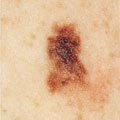I just found this site and thought I'd share one of the articles I saw listed. They have many interesting articles and information on new and break through research. Check it out! Dana Farber is one of the best cancer research institutes around!
First Targeted Therapy To Produce Remission Of Metastatic Melanoma
ScienceDaily (Apr. 17, 2008) — In a demonstration that even some of the most hard-to-treat tumors may one day succumb to therapies aimed at molecular "weak points," researchers at Dana-Farber Cancer Institute report the first instance in which metastatic melanoma has been driven into remission by a targeted therapy.
The report, published in the April 20 issue of the Journal of Clinical Oncology, describes the case of a 79-year-old woman with melanoma tumors in several parts of her abdomen. When lab tests showed the tumor cells carried an abnormality in a gene called KIT, the patient enrolled in a clinical trial involving Gleevec (R) (Imatinib), a drug known to target that gene.
Four weeks after beginning therapy, imaging exams showed a dramatic reduction in tumor size and metabolism: two of the tumor masses had disappeared and several others had shrunken considerably. Four months later, the tumors were still in check, and today, nine months after the start of therapy, she continues to take the drug and her condition remains stable.
"This is the first proof of principle that we can find an Achilles' heel in melanoma" -- a gene critical to tumor cell growth and proliferation -- "and, by targeting that gene with a drug, cause the cell to die," says the study's lead author, Stephen Hodi, MD, of Dana-Farber. "It is especially exciting because there haven't been any effective treatments for melanoma patients with metastatic disease."
Although the report involves just one patient, it should inject new confidence in the fight against melanoma, Hodi says. Because previous research has failed to find any genetic Achilles' heels capable of shutting down melanoma cell growth, some researchers had speculated that none may exist for such cells. The discovery of one suggests there may be others.
KIT mutations are found in only a small percentage of melanomas, so Imatinib does not represent a universal treatment for the disease, Hodi explains. Recent studies have found KIT mutations in 11 percent of acral melanomas (which arise in skin without hair follicles, such as that of the palms, foot soles, and nail beds, and account for 5 percent of all melanomas), 21 percent of mucosal melanomas (which arise in the mucous membranes of some organs), and 17 percent of melanomas arising in chronically sun-damaged skin. For patients with these conditions, particularly those who carry a mutation in a particular section of the gene, Imatinib may well prove beneficial.
Imatinib's effectiveness against tumors with KIT mutations was first demonstrated in gastrointestinal stromal tumors (GISTs), a relatively rare malignancy of the digestive tract. An estimated 75-80 percent of GISTs have KIT mutations, and Imatinib has caused such tumors to stabilize or retreat in 75-90 percent of patients receiving it. In most of these patients, however, tumors eventually begin growing again as they become resistant to the drug.
The KIT mutation in the patient described in the study involved a protein-coding section of the gene where DNA was duplicated. This section, known as the "juxtamembrane domain," is the most frequent site of mutation in GIST, and is associated with a strong tumor response to Imatinib.
"Dramatic remissions in metastatic melanoma are something that, as physicians, we've rarely seen," Hodi remarks. "Confirming these results will require enrolling additional patients in clinical trials -- something we're actively working to accomplish."
The senior author of the study is David E. Fisher, MD, PhD, who participated in the research as a Dana-Farber faculty member and is now at Massachusetts General Hospital. Other co-authors include Philip Friedlander, MD, PhD, Annick D. Van den Abbeele, MD, George Demetri, MD, Suzanne Mac Rae, MPH, Andrea Kruse, and Jyothi Jagannathan, MD, of Dana-Farber; Christopher Corless, MD, PhD, and Michael Heinrich, MD, of Oregon Health & Science University; and Elsa Velazquez, MD, of Brigham and Women's Hospital.
Funding for the research was provided in part by the Ron Gelb Melanoma Research Fund at Dana-Farber.
Adapted from materials provided by Dana-Farber Cancer Institute, via EurekAlert!, a service of AAAS.
Need to cite this story in your essay, paper, or report? Use one of the following formats:
APA
MLA
Dana-Farber Cancer Institute (2008, April 17). First Targeted Therapy To Produce Remission Of Metastatic Melanoma. ScienceDaily. Retrieved April 18, 2008, from http://www.sciencedaily.com? /releases/2008/04/080417211534.htm
Friday, April 18, 2008
Subscribe to:
Comments (Atom)



